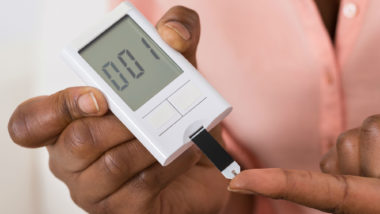 An Invokana amputation study recently said that the diabetes drug may increase the risk of a leg and foot amputation in patients.
An Invokana amputation study recently said that the diabetes drug may increase the risk of a leg and foot amputation in patients.
Invokana (canagliflozin), Invokamet (canagliflozin metformin), and Invokamet XR (canagliflozin and metformin hydrochloride extended-release) are type-2 diabetes drugs, part of the medication class known as sodium-glucose cotransporter-2 (SGLT2) inhibitors. The U.S. Food and Drug Administration (FDA) confirmed in May that an Invokana amputation study showed an increased risk of leg and foot amputations in patients treated with these drugs.
In a communication originally published on May 16, 2017, the FDA reported the following: “Based on new data from two large clinical trials, the U.S. Food and Drug Administration (FDA) has concluded that the type 2 diabetes medicine canagliflozin (Invokana, Invokamet, Invokamet XR) causes an increased risk of leg and foot amputations. We are requiring new warnings, including our most prominent Boxed Warning, to be added to the canagliflozin drug labels to describe this risk.”
The Invokana amputation study showed that patients treated with Invokana and other canagliflozin medications are twice as likely to undergo a diabetic amputation.
The CANVAS (Canagliflozin Cardiovascular Assessment Study) trial showed that, over the course of a year, 5.9 out of every 1,000 patients treated with canagliflozin experienced an amputation. Comparatively, only 2.8 out of every 1,000 patients treated with the placebo experienced an amputation.
Similar results were produced by the CANVAS-R (A Study of the Effects of Canagliflozin on Renal Endpoints in Adult Participants With Type 2 Diabetes Mellitus) trial. The results showed that 7.5 out of every 1,000 Invokana patients and 4.2 out of every 1,000 placebo patients experienced amputation over the course of a year.
Although toe and middle of the foot amputations were the most common outcome, the Invokana amputation study also recorded amputations of the leg both above and below the knee. Some patients in the study had more than one amputation, which in some case involved both limbs.
Patients may be at a higher risk of an Invokana amputation if they have peripheral vascular disease, neuropathy (nerve damage), diabetic foot ulcers (sores), or a history of prior diabetes amputation.
Although the risk of amputation is frightening, the FDA urges consumers to talk with their doctors before stopping Invokana or Invokamet due to the risks associated with untreated diabetes. Untreated type-2 diabetes can lead to blindness, nerve damage, kidney damage, and heart disease.
“Patients taking canagliflozin should notify your health care professionals right away if you develop new pain or tenderness, sores or ulcers, or infections in your legs or feet. Talk to your health care professional if you have questions or concerns. Do not stop taking your diabetes medicine without first talking to your health care professional.”
With the results of the Invokana amputation study now made public, consumers have started turning to Invokana manufacturers for answers. Consumers are concerned that the companies did not properly warn the public about the risks associated with their medications. The lack of information meant that patients and doctors were allegedly unable to make an informed decision about treatment with canagliflozin drugs.
Some individuals have taken legal action regarding the risk for Invokana amputations, aiming to hold manufacturers accountable for allegedly failing to test their medications and provide sufficient warnings.
Contact an experienced Invokana attorney today to discuss your legal options if you or a loved one had to undergo a lower limb amputation after taking Invokana, Invokamet or Invokamet XR, including a toe amputation, foot amputation, knee amputation or leg amputation. Fill out the form on this page to obtain a FREE case evaluation with an Invokana amputation attorney.
ATTORNEY ADVERTISING
Top Class Actions is a Proud Member of the American Bar Association
LEGAL INFORMATION IS NOT LEGAL ADVICE
Top Class Actions Legal Statement
©2008 – 2026 Top Class Actions® LLC
Various Trademarks held by their respective owners
This website is not intended for viewing or usage by European Union citizens.
Get Help – It’s Free
Join a Free Invokana Class Action Lawsuit Investigation
If you qualify, an attorney will contact you to discuss the details of your potential case at no charge to you.
Please Note: If you want to participate in this investigation, it is imperative that you reply to the law firm if they call or email you. Failing to do so may result in you not getting signed up as a client or getting you dropped as a client.
E-mail any problems with this form to:
[email protected].
Oops! We could not locate your form.












